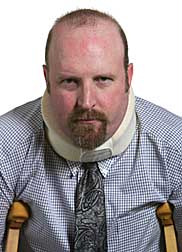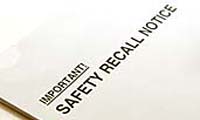LAWSUITS NEWS & LEGAL INFORMATION
Defective Products and Product Liability
A defective product causes injury or damage to a person or a person's property because of some defect in the product, its labeling or the manner in which the product was used. The manufacturer and others involved in distribution, sales or marketing of defective products can be held liable where injuries or property damage occur.
Defective products include a wide range of products including motorized vehicles, drugs and medical devices, toys, household products and any other product that has been defectively designed, manufactured or labeled.
Under product liability law, companies or individuals who make products available to consumers are held responsible when those products cause harm. Essentially, product liability law means that consumers who are harmed by defective products can be compensated for that harm.
FREE CASE EVALUATION
Send your defective products claim to a Lawyer who will review your claim at NO COST or obligation.
Get Legal Help Now
Get Legal Help Now
[ESPANOL]
Defective Motorized Vehicles
Defective motorized vehicles can cause car accidents that result in devastating injuries and death. Such accidents are often the cause of faulty manufacturing of the automobile. Examples of defective motorized vehicles include airbag failure, door latch failure, vehicles prone to rolling over, roof crush, brake failure and seatbelt failure.In instances where the faulty design or manufacture of a vehicle or its component parts results in a car accident, vehicle manufacturers and dealers could be held responsible for any harm caused by the accident.
Defective Products Causing Injury
 Defective products can cause serious personal injury and even death. There are a number of ways that product liability—when a defective product is responsible for injury—can occur. First is that the product could have been defectively designed or engineered. This could mean that the product was rushed to market and not properly analyzed for potential problems. The end result is that the product did not work in the manner intended and, as a result, caused harm. Furthermore, the product could have been properly designed but experienced an error during manufacturing, causing a defect.
Defective products can cause serious personal injury and even death. There are a number of ways that product liability—when a defective product is responsible for injury—can occur. First is that the product could have been defectively designed or engineered. This could mean that the product was rushed to market and not properly analyzed for potential problems. The end result is that the product did not work in the manner intended and, as a result, caused harm. Furthermore, the product could have been properly designed but experienced an error during manufacturing, causing a defect.The second form of product liability occurs when the product itself is safe, but there are improper instructions for use of that product or inadequate warnings regarding risks associated with the product.
The third form of product liability causing injury occurs with products that are inherently unsafe but are still put in the hands of the consumer. In such cases, even with proper design, manufacture and labeling, the product could still cause injury because of its very nature. In such situations, consumers can file product liability lawsuits if they are harmed by the product.
Defective Products Causing Property Damage
Consumers can file lawsuits in situations where defective products cause harm to their property. Some examples of defective products causing property damage include appliances that malfunction causing fire, pipes being improperly manufactured causing flooding, rust or corrosion, and actual components of the house—such as drywall—being improperly manufactured causing damage to the home. Such situations can cause not only harm to the property, they can also cause harm to the people who live in the homes.Product Recalls
 The U.S. Consumer Product Safety Commission (CPSC) has the responsibility of protecting consumers from unreasonable risk of serious injury or death from consumer products. This includes alerting the public to products recalled due to unreasonable risks. Products that are found to have caused harm or that are likely to cause harm are recalled in the interest of consumer safety.
The U.S. Consumer Product Safety Commission (CPSC) has the responsibility of protecting consumers from unreasonable risk of serious injury or death from consumer products. This includes alerting the public to products recalled due to unreasonable risks. Products that are found to have caused harm or that are likely to cause harm are recalled in the interest of consumer safety.
Defective Product Liability
There are four legal means for establishing liability in cases where a defective product has caused injury:- Negligence occurs when expected, reasonable care is not taken and a legal responsibility exists to do so. The lack of care can be accidental or on purpose.
- Breach of warranty takes place when a seller fails to uphold a claim or promise about a product.
- False advertising that leads consumers to believe a product is safer than it really is, or distracts them from potential risks inherent in the use of a product, can be argued as misrepresentations under breach of warranty or under strict liability.
- Strict liability makes the manufacturer or seller of a defective product responsible for all injuries occurring from the use of the product. The victim must show that the product was defective and that the defect was the cause of the personal injury. If so proven, then strict liability holds the manufacturer or seller responsible, regardless of fault or intent
Product Liability Lawsuits
Product Liability Lawsuits involve injury caused by a defective product. Companies sued in product liability cases include the manufacturer of the defective product, the wholesaler or distributor of the product and often the retailer of the product. Overall, there has been an increase in product liability lawsuits—and jury awards—against big businesses, particularly pharmaceutical companies. In 2009, five of the 50 largest lawsuits nationwide concerned product liability lawsuits, compared to just one case included in the top 50 the previous year.Many states have enacted detailed products liability statutes regarding product liability lawsuits, which can be based on negligence, strict liability, or breach of warranty of fitness, depending on the jurisdiction within which the claim is based. The most common types of product liability lawsuits include automobile product liability claims such as the recent Toyota , toxic exposure injury claims such as asbestos, and a number of dangerous drugs made by pharmaceutical companies.
Attorneys handling product liability lawsuits have recovered millions of dollars on behalf of people hurt or killed by defective products, from industrial equipment to automobiles to hip implants and other medical devices. Any commercial and consumer product proven defective and has caused injury can potentially be involved in a product liability lawsuit.
Product Liability Lawyers
Product liability lawyers will evaluate cases involving defective consumer goods that cause physical injuries such as burns, fractures, head injuries and blindness. Lawsuits can be brought against manufacturers for design defects, improper safety devices and manufacturing defects, and marketing defects (failure to warn of possible hazards).Defective product law involves defective and unreasonably dangerous products that cause personal injuries and even death. Manufacturers of products are liable for design defects, improper safety devices and manufacturing defects that cause injury.
DEFECTIVE PRODUCTS HOT ISSUES
- Lead Poisoning Lawsuit alleging that serious damage is done to children who have injested or been exposed to lead.
- Defective Catheters recalls for catheter separation and breakage, possibly leading to device fragments being caught in the patient's soft tissues.
- Defective Knee Implants (Implant failure)
DEFECTIVE PRODUCTS LAWSUITS
- Defective Catheters recalls for catheter separation and breakage, possibly leading to device fragments being caught in the patient's soft tissues.
- Exactech Optetrak Knee Replacement Failure Lawsuit
- CPAP Sleep Machines Recalled, CPAP Lung Cancer Lawsuit Filed
DEFECTIVE PRODUCTS SETTLEMENTS
- Chris Bent v Sears Roebuck and Electrolux Home Products Verdict for Plaintiff for US$7,500,000
- Salliotte v. Ford Motor Co. and the First Baptist Church Verdict for Plaintiff for US$25,910,000
- AbbVie to Pay $3M in Androgel MDL Settlement
FEATURED LAW FIRM

TopDog Law Personal Injury Lawyers is a personal injury law firm with a track record of success. If you've been injured due to no fault of your own, call them today for a free consultation.
CONTACT THIS LAWYER
Defective Products Legal Help
If you have been injured using a defective product, you may be entitled to compensation for your injuries, please click the link below to submit your complaint to a personal injury attorney who will evaluate your claim at no cost or obligation.
Updated on
